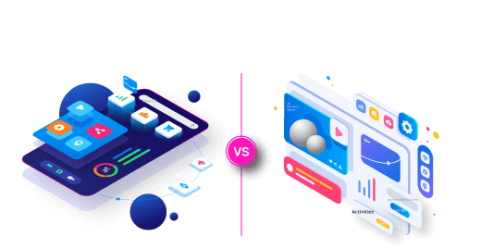The digital world is full of opportunities, and at its heart lies an essential decision for business: web apps vs. mobile apps.
Both options offer benefits and drawbacks depending on your goals, target audience, budget, and other factors. But always remember this decision can make or break your business’s success. So, where should you invest: A web app accessible from any browser or a mobile app designed for on-the-go convenience?
In this blog, we’ll explore key differences between mobile apps and web apps. In addition, you will get an answer to the better question: web app vs mobile app development.
Understanding Mobile Apps & Web Apps Development
What are Mobile Apps?
Mobile applications are software designed to run on mobile devices such as smartphones or tablets. Users download and install these apps from platforms like the Apple App Store or Google Play Store. Mobile app development service includes designing, developing, testing, and deploying.
Android or iOS app development let your business grow at full potential.
Two Types of Mobile Apps:
Hybrid Mobile Apps use web technologies and can run on multiple platforms with a single codebase.
Native Mobile Apps are built for a single platform like iOS or Android.
What are Web Apps?
Web apps can be accessed over the internet through a web browser. Web app development service includes building and maintaining these software applications using technologies like HTML, CSS, and JavaScript.
Mobile Apps Vs. Web App Development: Growth & Market Stats
According to Statista, 85% of internet traffic comes from mobile devices, highlighting their significant role in dominating online interactions. But, 53% of this traffic comes from websites.
Web Development market size was valued at US$ 60709.6 Million in 2024 and will reach US$ 96748.41 Million in 2031, with a CAGR of 8.08% during 2024-2031
Research indicates that users spend 3-4 times longer engaging with mobile apps than websites or web apps.
Here are a few mobile app development market stats & trends:
The global mobile application market size was USD 228.98 billion in 2023 and is projected to grow at a CAGR of 14.3% from 2024 to 2030.
Revenue in the Application Development market is projected to reach US$179.90bn in 2024 and is expected to reach USD 234.70 billion by 2028, with a CAGR of 6.87%.
Mobile app market revenue by types in USD billion (2022 - 2027) is shown below figure:

Web App vs. Mobile App Development: What are Key Differences?
Here is a breakdown of the significant differences between web apps and mobile apps.
Aspect | Web Apps | Mobile Apps |
Platform | Accessed via web browsers on any device | Installed on specific mobile operating systems |
Development | Typically developed using web technologies | Developed using platform-specific languages (e.g., Swift, Kotlin) |
Distribution | Accessed directly via URL | Available in app stores like Apple App Store & Google Play Store |
Performance | May have slower performance compared to native mobile apps | Typically offers better performance and responsiveness |
Access to Features | Limited access to device-specific features | Full access to device-specific features and APIs |
Offline Functionality | Limited offline functionality | Can offer robust offline functionality |
Updates | Updates are immediately available | Updates require user to download new versions from app stores |
Installation | No installation required | Requires installation from app stores |
Cross-Platform Support | Compatible across different devices and operating systems | iOS & Android |
Here's a table outlining the key differences in the development process between web apps and mobile apps:
Aspect | Web App Development | Mobile App Development |
Development Approach | Typically follows web development standards and frameworks (HTML, CSS, JavaScript) | Platform-specific development using languages like Swift (iOS) or Kotlin (Android), or cross-platform frameworks like React Native or Flutter |
UI/UX Design | Responsive design for various screen sizes | Platform-specific UI/UX design for iOS or Android guidelines |
Development Tools | Text editors, integrated development environments (IDEs), and web development tools | Platform-specific IDEs (Xcode for iOS, Android Studio for Android) and additional SDKs |
Testing | Testing across different web browsers and devices using browser developer tools and testing frameworks | Platform-specific testing tools and emulators/simulators for iOS and Android |
Deployment | Deployed on web servers accessible via URLs | Deployed through app stores (e.g., Apple App Store, Google Play Store) |
Updates | Immediate updates with changes reflected upon next page load | Updates pushed through app stores, requiring user downloads and installations |
Distribution | Accessible via any web browser | Distributed through app stores, reaching platform-specific audiences |
Performance Optimization | Optimization for web browser rendering and network performance | Optimization for device hardware, memory usage, and battery efficiency |
Web Apps vs Mobile apps: Which One is Ideal for your Business?

Investing in web app development or mobile app development for business relies on different factors, such as your business goals, target audience, and functionality needs.
Here are some considerations to help you decide where to invest:
#1 - Offline Accessibility
If you need to access locations where interest connects is an issue, building a mobile app is the right choice. Many mobile apps can function offline, such as gaming, maps, language translation, and more, while web apps generally require an internet connection.
In terms of offline accessibility, mobile apps beat web apps.
#2 - Development Speed & Quick Launch
Web app development is the right choice for a quick launch as it doesn't require any app store approval. It requires around 1-2 months for a simple web app that's less than mobile app development speed, i.e., 2-4 months.
The average review duration for an iOS app stands at 4 days, as per the analysis of 216 user reviews submitted within a two-week period. Apple reserves the right to reject apps if they believe they contain certain undesirable elements.
- substandard UI
- incomplete information
- ads
- bugs
- broken links
A web app or a hybrid app is a winner in terms of development speed & quick launch.
#3 - Larger Target Audience
A web app can help you reach a massive user base. As per Google search traffic data, 77% of user traffic comes from web apps, as shown in the pie chart.

You can easily share website content through social media, email, and other online channels, allowing for a wider organic reach. It can drive significant traffic without depending solely on app store visibility.
If you want to reach a larger audience, web app development would be a better choice for your business.
#4 - Performance
Web apps depend on internet connectivity and browser rendering engineers. It can lead to slower loading timers and less responsive user experiences, especially in slow network connections. Overall, web apps offer cross-platform app development framework compatibility and easier distribution.
On the other hand, mobile apps generally provide better performance and a more seamless user experience. It's suitable for applications that require intensive processing or real-time interactions.
In terms of performance, mobile apps are better than web apps.
#5 - Visibility and Accessibility
App discoverability and distribution channels are other important factors you need to consider choosing the right one between web apps and mobile apps.
Benefit from SEO strategies, enhancing web apps' discoverability in online searches. With keywords and relevant content, web apps can attract organic traffic and expand their user base over time.
Mobile App distribution depends on app stores such as Apple App Store and Google Play Store. App store optimization (ASO), ratings, and reviews are a few factors that influence an app's visibility.
Tie Between them in terms of visibility and accessibility.
#6 - Specific Features
Device-specific features or functionalities play a vital role in deciding between web apps and mobile apps. Apps that include real-time navigation or camera features depend heavily on device hardware like GPS and cameras.
Web apps cannot replicate these functionalities to the same extent.
If your app needs device's features, a native mobile app would be a better choice. But, advancements in technologies like HTML5 and Web APIs are enabling web apps to access some device features like geolocation and camera functionalities.
In terms of accessing and utilizing device-specific features, the mobile app is the winner.
#7 - Development Budget
The cost to develop a successful mobile app is higher than that of web app development. So, if your budget is a minimum of $15K, go with web app development.
Mobile app development costs start from $15,000, and a feature-rich app with advanced functionalities can go up to $1,00,000 or more. The cost of building mobile apps based on stages is shown below figure:

On the other hand, the average startup budget for web app development can range between US$10,000 to US$150,000. The actual cost depends on different factors like the product's complexity and the specific web app development services utilized by the business.
If you have a low budget, invest in web app development instead of mobile application development.
#8 - Platform Compatibility
Another factor you need to consider when you invest in web apps or mobile apps is platform compatibility.
Web apps offer compatibility across all devices with a web browser, regardless of the operating system or device type, including desktop computers, laptops, tablets, and smartphones running on Windows, macOS, iOS, Android, or other operating systems.
In contrast, mobile apps are designed for specific mobile platforms like iOS or Android, allowing for optimization and integration with native features. However, this specialization limits compatibility with devices on different platforms.
Overall, web apps are a winner in terms of platform compatibility.

Web Apps Vs. Mobile App Development: When to Choose?
When should you build a web app and a mobile app?
Choose to build a web app when:
- you want to reach a broader audience,
- your audience is present on the desktops more,
- you care about the speed of development,
- you want to launch the product quickly.
Choose a mobile app development when:
- users will access your app multiple times a day,
- you want to send push notifications to your users,
- you need to access specific phone native features,
- you care about the high performance,
- people will often use your product offline,
- your product involves navigation or location-based elements.
Web Apps Vs. Mobile App Development: Pros & Cons
Web App Development Pros & Cons:
Pros | Cons |
Cross-Platform Compatibility | Limited Performance |
Easier Maintenance | Dependency of Internet Connection |
No Installation |
|
No Updation Required |
|
Mobile App Development Pros & Cons:
Pros | Cons |
Better Performance | Platform Dependency |
Access to Device Features | Installation Barrier |
Improved User Experience |
|
Offline Functionality |
|
Popular Web and Mobile Apps in Industries
Here are some popular web and mobile apps across various industries:
- Social Media: Facebook, Twitter, Instagram, TikTok
- E-commerce - Amazon, eBay, Walmart
- Finance - PayPal, Venmo, Cashback
- Travel - Airbnb, Uber, Lyft
- Health & Fitness - Headspace, MyFitnessPal
- Food Delivery: Uber Eats, DoorDash, Grubhub
- Education - Duolingo, Coursera
Mobile Apps vs. Web Apps Development: Which One is Better (Final Thought)
Hopefully, you have now understood the critical difference between web apps vs. mobile apps.
Select a web app for startups due to its affordability and broader audience reach. On the other hand, mobile apps have superior monetization potential and user experience. Ultimately, the choice depends on the company's objectives and target demographics, determining whether a web or mobile app development is more suitable.
But you don't have to push yourself to select just one. Many businesses thrive with robust web apps and a user-friendly mobile app, offering the best of both audiences. Whether web app development or mobile app development, it would be better to collaborate with a custom software development company like VLink for your project's success.

Build a Successful Mobile App or Web App with VLink!
We are a trustworthy web and mobile app development company focused on building quality software products. Our dedicated development teams are experts in several technology stacks. They help clients design and create superior quality apps for web and mobile, enabling seamless user experience across all platforms, whether Android or iOS.
Take your online business to a new height with our experts; contact us now!





 Shivisha Patel
Shivisha Patel

 Nikhil Khandelwal VP Engineering
Nikhil Khandelwal VP Engineering














